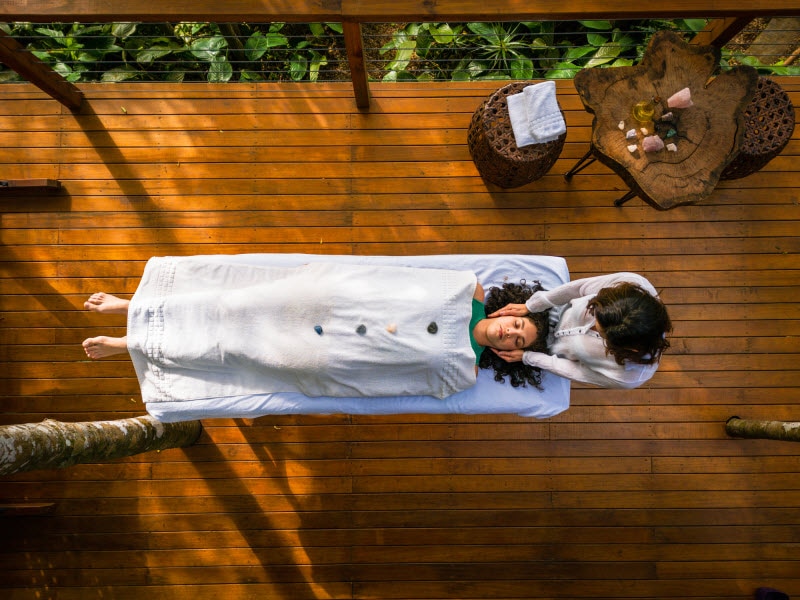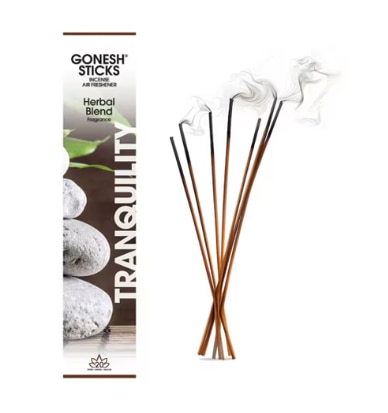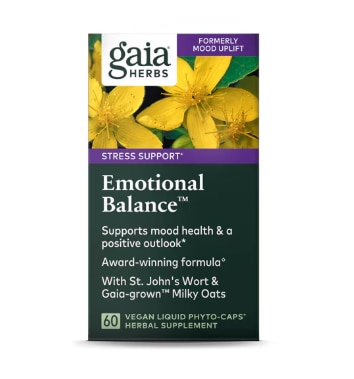From digital detoxes to dopamine fasts, wellness trends can occasionally feel like nothing more than passing fads.
And yet, if there’s one craze that’s proved to have staying power, it’s reiki—a Japanese form of energy healing that’s presently used by more than 1.2 million adults in the United States. Celebrities ranging from Gwyneth Paltrow to Cameron Diaz tout its advantages, while older research reveals that more than 800 hospitals in the country offer reiki as a complementary therapy.
But what is reiki, really? Does it bear similarities to yoga, meditation…or, say, acupuncture? And is it a legitimate option for recovery, or should you stick with the basics?
Let’s dive into these questions and get to the root of what reiki is, how it purportedly works and how you may benefit from its often-indescribable magic.
What is reiki?
To understand reiki is to understand its etymology.
“Rei,” in Japanese, means “spirit” or “universal,” and “ki” translates to “energy” or “life force”—or what many of us associate with “qi.” (For those not in the know, according to Traditional Chinese Medicine, qi refers to the vital life force that flows within both the universe and body.)
As with anything in our bodies and life itself, such energy faces blockages at times that interrupt the natural movement and fluidity of your life force. The causes behind these obstructions? Theoretically, they’re due to:
- Chronic or acute stress, such as caring for an ill family member over a long period of time or a disagreement with your boss
- Trauma, whether it’s the emotional repercussions of dealing with a natural disaster or the loss of a loved one
- Negative emotions, like depression, anxiety and/or repressed feelings
- Lifestyle choices, such as excessive alcohol consumption or a lack of restorative sleep
- Dysfunctional beliefs, ranging from imposter syndrome to diminished self-worth
It’s further believed that energy blockages aren’t simply prompted by psychological or emotional factors. Illnesses—cancer, Parkinson’s disease, infertility and autoimmune disorders, among other health complications—may also interrupt the flow of your vital life force. The same could be said for accidents and injuries.
Reiki, which is also known as “biofield energy therapy,” aims to clear these impediments and return the body to a state of homeostasis, or balance.
How does reiki work?
Typically, they place their hands on or above your body’s main chakras, or energy centers, such as your anahata (or heart chakra)—which represents love and compassion—and your muladhara (root) chakra, which, hypothetically, helps you feel safe, grounded…and wholly connected to your physical self.
What are the alleged benefits of reiki?
Studies demonstrate that reiki got its start over 2,500 years ago in Eastern cultures before it was resurrected by Dr. Mikaeo Usui in the early 20th century. One of Usui’s disciples—Chujiro Hayashi—trained a Hawaiian woman of Japanese descent by the name of Hawayo Takata, who eventually brought reiki to the West and popularized the niche practice, ultimately turning it into a modality that is increasingly as prevalent as sound healing and tapping.
A large part of reiki’s allure is that it ostensibly targets many of our contemporary woes. Advocates of the treatment maintain that reiki may:
- Improve sleep
- Boost energy
- Diminish anxiety and depression
- Minimize stress
- Encourage a brighter mood
- Aid blood circulation
- Reduce pain
- Support relaxation
Sound wonderful? No doubt. But the question remains: Does reiki actually work?
Here’s what the science says…
To date, the research on reiki has uncovered mixed results at best—in large part because, while Western medicine is progressively opening up to the tenets of Eastern healing, that “vital life force” has yet to be quantified by traditional, allopathic practitioners in the United States and Western world.
Nonetheless, some of the studies on reiki show promise:
- An older 2019 study indicated that reiki exhibited potential in providing relief from depression, anxiety and pain in end-of-life care. However, the authors of the study also say more research needs to be conducted to determine reiki’s genuine efficacy.
- A 2024 systematic analysis of five studies on reiki found that the ancient practice tempered pain, fatigue and stress in cancer patients and enriched their quality of life.
- Another systematic review, published in 2022, discovered that reiki may be more effective than a placebo in treating mental health symptoms like depression, anxiety, burnout and stress.
- A large-scale trial on reiki’s effectiveness, featured in the Journal of Alternative and Complementary Medicine, asked 99 reiki practitioners in the country to question their clients’ on how they felt before and after a reiki session. Responses ranged from less nausea to an enhanced mood.
- A 2024 study on reiki’s impact on sexuality disclosed that it was correlated with improved sexual confidence in women suffering from sexual distress.
Lastly, a controlled trial from 2024 unveiled that reiki bolstered sleep quality in prostate and breast cancer patients undergoing hormone therapy.
Scientific studies aside, there’s also non-empirical, anecdotal evidence. Take it from journalist Amy Webber, for example, who, after her first reiki session, reported that “…after just one session, I felt incredibly light and relaxed. My mind was so quiet—the complete opposite of the usual ticker tape of things whizzing through it any given moment…I know it may sound abstract, but I also know that the calmness and clarity I felt was very real.”
How does a reiki session unfold?
Intrigued by reiki—and want to give it a try?
First, keep in mind that reiki is not a panacea for chronic pain, illness or mental health symptoms; instead, it’s a complementary, or supplementary, treatment that’s best paired with other healing modalities—whether that’s medication your physician has prescribed, surgery, physical therapy, massage, radiation, psychotherapy or the like.
Once you understand that reiki is merely a tool that may enrich your sense of wellness and not a stand-in for medical treatment, be selective about the reiki practitioner you select by consulting with friends, family members, teachers and colleagues who rely on this form of energy medicine.
Don’t know anyone who has ventured into this realm? Ask your healthcare professional for a recommendation, or search for a practitioner within a healthcare environment. (The Center for Reiki Research offers a list of medical practices, hospitals, and hospice programs that provide reiki.) Just be sure that the practitioner you choose is certified and has received their training from a reiki master.
After you’ve found “your person,” you’ll likely be taken into a private, quiet area and, in some cases, be asked to sign a consent form and/or do an intake. Either ambient noise, quiet, serene music or no sound at all will be in the background as you lie down or sit in a comfortable chair. The practitioner will then use a gentle, non-intrusive touch (or will hover their hands) above your head, torso and back (and, possibly, your feet). You may close your eyes; some, perhaps even you, may fall into a light asleep. Finally, most sessions last anywhere between 15 minutes and two hours.
My advice? Wear loose, comfortable clothing—and walk in with an open mind.
As for what you can expect after your reiki session? You may experience everything from more vivid dreams to a wonderful feeling of peace.
Are there any side effects of reiki?
According to the National Center for Complementary and Integrative Health, reiki has not been linked to any harmful side effects. Bear in mind, though, that everyone reacts to treatments differently. And if you feel strange or uncomfortable, simply (and kindly) ask your practitioner to end the session.
How much does reiki cost?
It varies widely. Some sessions may be as little as $25; others may be $100 or more. Do note, however, that reiki may be covered by some insurance policies—for example, if it’s been prescribed by your doctor, or during a hospital stay.
I’m still skeptical of reiki. What else can I do to improve my overall well-being?
It’s understandable, particularly if you’re the sort of person who prefers hard data on a treatment’s usefulness.
Your lifestyle is by and large the single most important determinant in your wellness. Striving to eat a healthy, balanced diet, exercise regularly, banish stress, sleep soundly and engage in activities that bring you pleasure may supply you with the very things reiki promises to reap.
And if you’re still interested in alternative healing? By all means, give that yoga, meditation and acupuncture a whirl: All three therapies have been scientifically proven to provide a host of sublime benefits, with a happier mood, increased tranquility and pain relief chief among them.
Is reiki worth it?: The bottom line
Ultimately, the benefits that may be unearthed through a reiki session (or sessions) all come down to the individual. Some may find it the epitome of harmony. Others may experience a heightened understanding of their life and the decisions they must make. Many may feel like they’ve entered a trance-like state. And others still may report feeling nothing at all. And yet, given its cost efficiency and safety, why not—in the name of wellness—give it a try?




